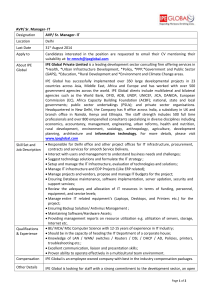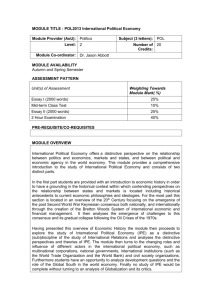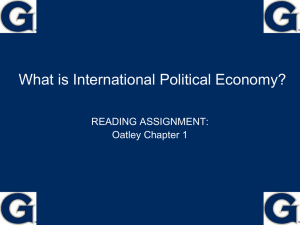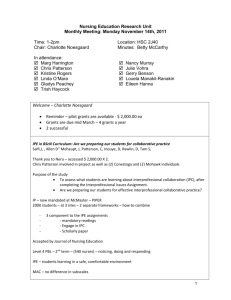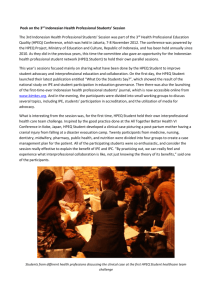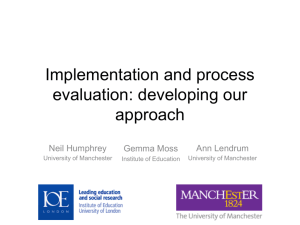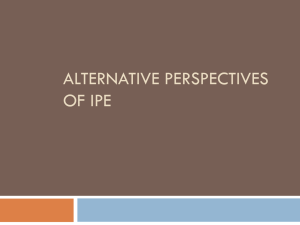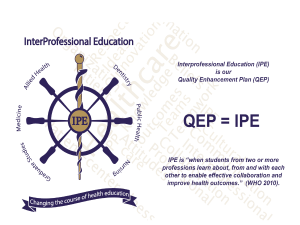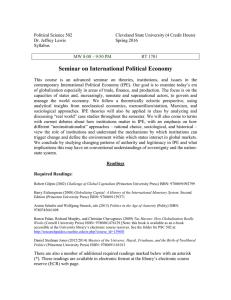3250 Lecture - Introduction
advertisement
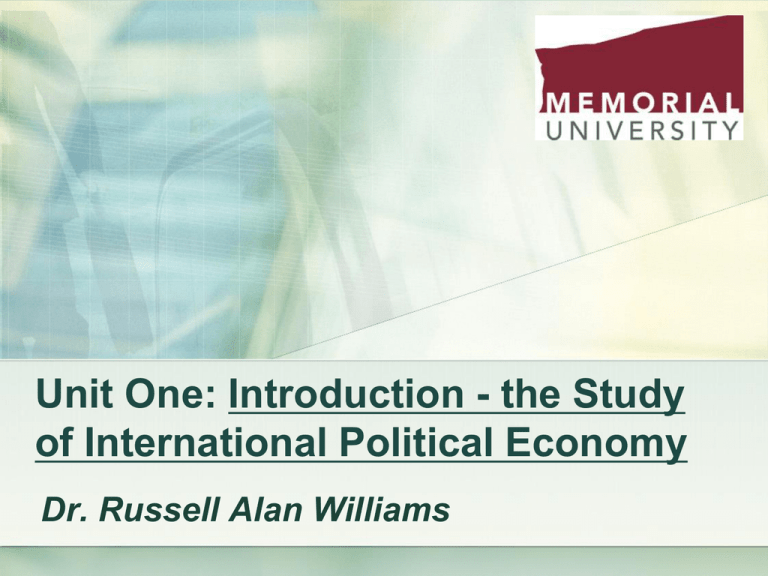
Unit One: Introduction - the Study of International Political Economy Dr. Russell Alan Williams Required Reading: Cohn, Global Political Economy, and Chs. 1-2. Class Discussion Reading: Kratke and Underhill, “Political Economy: The Revival of an “Interdiscipline’,” in Stubbs and Underhill, Political Economy and the Changing Global Order, (Oxford 2006), pp. 24-38. Gerefi, Garcia-Johnson and Sasser, “The NGO-Industrial Complex,” Foreign Policy, 125 (July/August 2001), pp. 56-65. Outline: 1. 2. 3. 4. 5. Introduction – What is IPE? Key Research Questions Theories of IPE Post War “Embedded Liberalism” For Next week . . . 1) Introduction – What is International Political Economy? Scope: IPE studies the interaction (?) of states and markets States associated with pursuit of power Markets associated with pursuit of wealth Tension between states and markets? States seek to increase power Markets associated with reduced state power Supportive relationship between states and markets? States create conditions for markets E.g. Protect private property, create trade agreements . . . Wealth is essential to military power E.g. China . . . . 1) Introduction – What is International Political Economy? 1) Introduction – What is International Political Economy? Scope: IPE studies the interaction (?) of states and markets Is “interaction” the right way to think about this? 1) Introduction – What is International Political Economy? Academic Field - Subfield of International Relations (IR) From 1950 – 1970 IR focused on states’ pursuit of power and security “high politics” versus “low politics” After 1970 international economics taken more seriously “Rediscovery” of classic concern about relationship between economy and power e.g. Thucydides, Mercantilism, Leninism Academic Field - Subfield of International Relations (IR) Most IPE scholars are political scientists . . . Many who study trade and finance are economists but . . .. Problem of Economism – states matter in in IPE in a way that economists do not have tools to study 2) Key Research Questions: a) Globalization: Focus of debate on the impact on states . . . From “erosion” of power/capacity to ????? Policy Implications: More reliance on international markets in allocating resources? Formation of regional blocs to insulate states/societies from global competitiveness and uncertainty e.g. European Union (EU), NAFTA and MERCOSUR 2) Key Research Questions: a) Globalization - Theories: i) “Hyper Globalists”: A single, global economic and social formation has/is emerging . . . E.g. Kenichi Ohmae “The Borderless World” State is being replaced with a system of intense multilevel governance ii) “Internationalists”: Interdependence among economies/states is obvious but . . . State is still the central actor and interstate relations must therefore be our focus Interdependence is not new – globalization is a buzzword 2) Key Research Questions: a) Globalization - Theories: iii) “Moderate Globalists” or “transformationalist” perspective: Much has changed in the modern period, but changes are uneven E.g. Difference between financial industry and agriculture Key point: Interstate relations, state power and protection of national sovereignty etc. are still key concerns, but they have been joined by new actors and new authority structures E.g. Multinational Corporations (MNCs) and Transnational Advocacy Networks 2) Key Research Questions: b) North/North cooperation & conflict: Globalization/interdependence increases need for international cooperation, but . . . Also increases possibility of conflict E.g. Current disputes over exchange rates Cooperation comes from two sources? i) “Hegemony”: Britain in the mid 19th Century US in the post - WW II era US economy was 50% of global GDP Big debate: Has US been in decline? What will this it mean? ii) International Institutions – provide North-North cooperation Keystone International Economic Organizations (KIEO’s) World Bank (IBRD) GATT World Trade Organization WTO International Monetary Fund (IMF) Informal coordination and cooperation mechanisms: Organization for Economic Cooperation and Development (OECD) G5 G7 G8 G20: All manage relations amongst the “The Triad” – maintain cooperation for “open economic order” Argument: US decline has led to more regional conflict Argument: US + EU declining relative to rest of world Argument: 2008 Financial Crisis has demonstrated need for new institutions Bottom Line: Through either hegemony or international institutions states of the north have “run the system” Will increasing tension amongst the “north” undermine this? 2) Key Research Questions: c) North-South Relations: “South”? - Economically & politically marginalized regions . . . . The “LDC’s”(?) Traditionally called for global cooperation to reduce imbalance in wealth and power E.g. Support for development: UNCTAD E.g. Opposition to North’s dominance in KIEO’s: G77 21st Century??? Share of global GDP has grown rapidly, however . . . Southern states have either not been able to coordinate interests Southern states have pursued individual goals E.g. G77 G8 with China G20??? c) North-South Relations: “South”? - Economically & politically marginalized regions . . . Economic growth has redistributed the weight of economic Power OPEC (1980s) Newly Industrializing Economies (NIE’s or NIC’s) South Korea, Taiwan, Singapore . . . Indonesia (2000 and beyond) BRIC’s and Emerging Market Economies E.g. Opposition to North’s dominance in KIEO’s Bottom Line: Rising influence of China, India and Brazil challenges existing institutions 3) Theories of IPE: Social scientific study of IPE requires theory There are no “facts” independent of theory . . . E.g. Measuring “US decline” requires a theory of power IPE tends to be a highly “theoretical” and “normative” branch of social science Major theoretical approaches: Realism “Liberalism”(?) Historical Structuralism (Marxist-influenced approaches) Feminism Constructivism 4) Post War “Embedded Liberalism” Breton Woods Conference (1944): 44 countries – half from the developing world! -Created KIEO’s -Supported “Embedded Liberalism” International free trade 2. Domestic conditions for prosperity, full employment and welfare states = social stability 1. 4) Post War “Embedded Liberalism” “Embedded Liberalism” Required “Keynesianism” and Breton Woods System Particularly concerned about financial problems - Wanted to reduce the exchange rate volatility = had contributed to the great depression System combined free trade with financial controls and stabilization Institutions of Breton Woods: a) General Agreement on Tariffs and Trade (GATT): Established to promote free trade Replacement for failed International Trade Organization (ITO) Informal, but VERY effective in reducing tariffs North(US!) dominated the GATT – Not under formal UN control Market size important in negotiations b) International Bank for Reconstruction and Development (IBRD) – The World Bank: Provided long term development loans for reconstruction and development in poor regions However, It’s a bank Tended to lend money to those who could afford it . . . c) International Monetary Fund (IMF): Key player in the “Breton Woods System” of financial controls Intended to promote monetary/currency stability Response to problem of “competitive devaluations” “Pegged” exchange rates & gave loans to countries having trouble staying at exchange rate System could only work if states limited capital flows After end of Breton Woods System: Became involved in “LDC” debt crises management Became architect of unregulated global finance World Bank and IMF formally part of the UN Under Economic and Social Council In reality, independent of UN Both subject to “weighted voting” based on economic importance North dominates Bank president always American(?), IMF always European(?) Embedded Liberal arrangements worked well . . . for a while Economic growth Cooperation in North Thinking theoretically – Success of KIEO’s and Embedded Liberalism ensured by: 1. 2. US hegemony Success of institutions in promoting cooperation amongst “triad” 3. Also reflects north’s economic dominance in global order Fostered global capitalism Further Reading: Thomas Biersteker, “Evolving Perspectives in International Political Economy: Twentieth-Century Contexts and Discontinuities," International Political Science Review, 14 (1993), pp. 7-33. Good “backgrounder” to theories of IPE before the subsequent weeks. For Next Time: Unit Two: Realist Theory and IPE Required Reading: Cohn, Ch. 3. Class Discussion Reading: Strange, “The Future of the American Empire,” Journal of International Affairs, Fall 1988, Vol. 42 Issue 1, pp. 1-17. Susan
